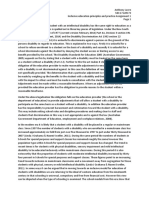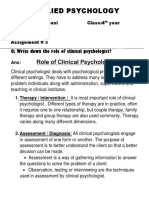Psychology
Psychology
Uploaded by
Jz AndamunCopyright:
Available Formats
Psychology
Psychology
Uploaded by
Jz AndamunCopyright
Available Formats
Share this document
Did you find this document useful?
Is this content inappropriate?
Copyright:
Available Formats
Psychology
Psychology
Uploaded by
Jz AndamunCopyright:
Available Formats
Psychology is the study of the mind, occurring partly via [1][2] the study of behavior.
Grounded in scientific [1][2] method, psychology has the immediate goal of understanding individuals and groups by both establishing general principles and researching specific [3][4] cases, and for many it ultimately aims to benefit [5][6] society. In this field, a professional practitioner or researcher is called a psychologist, and can be classified as a social, behavioral, or cognitive scientist. Psychologists attempt to understand the role of mental functions in individual and social behavior, while also exploring the physiological and neurobiological processes that underlie certain cognitive functions and behaviors. Psychologists explore such concepts as perception, cognition, attention, emotion, phenomenol ogy, motivation, brain functioning, personality, behavior, and interpersonal relationships. Psychologists of diverse stripes also consider the unconscious [7] mind. Psychologists employ empirical methods to infer causal and correlational relationships between psychosocial variables. In addition, or in opposition, to employing empirical and deductive methods, some especially clinical and counseling psychologistsat times rely upon symbolic interpretation and other inductive techniques. Psychology has been [8] described as a "hub science", with psychological findings linking to research and perspectives from the social sciences, natural sciences, medicine, and the humanities, such as philosophy. While psychological knowledge is often applied to the assessment and treatment of mental health problems, it is also applied to understanding and solving problems in many different spheres of human activity. The majority of psychologists are involved in some kind of therapeutic role, practicing in clinical, counseling, or school settings. Many do scientific research on a wide range of topics related to mental processes and behavior, and typically work in university psychology departments or teach in other academic settings. Some are employed in industrial and [9] organizational settings, or in other areas such as human development and aging, sports, health, and the media, as well as inforensic analysis and other aspects of law.
looks at psychopathology and abnormal behavior. The term covers a broad range of disorders, from depression to obsession-compulsion to sexual deviation and many more. Counselors, clinical psychologists, and psychotherapists often work directly in this field. 2. Behavioral Psychology Behavioral psychology, also known as behaviorism, is a theory of learning based upon the idea that all behaviors are acquired through conditioning. While this branch of psychology dominated the field during the first part of the twentieth century, its hold loosened during the 1950s. However, behavioral techniques remain a mainstay in therapy, education and many other areas. 3. Biopsychology The branch of psychology focused on the study of how the brain influences behavior is often known as biopsychology, although it has also been called physiological psychology, behavioral neuroscience and psychobiology. 4. Cognitive Psychology Cognitive psychology is the branch of psychology that focuses on internal states, such as motivation, problem solving, decision-making, thinking, and attention. This area of psychology has continued to grow since it began taking hold in the 1960s. 5. Comparative Psychology Comparative psychology is the branch of psychology concerned with the study of animal behavior. The study of animal behavior can lead to a deeper and broader understanding of human psychology. 6. Developmental Psychology This branch of psychology looks at development throughout the lifespan, from childhood to adulthood. The scientific study of human development seeks to understand and explain how and why people change throughout life. This includes all aspects of human growth, including physical, emotional, intellectual, social, perceptual, and personality development. Topics studied in this field include everything from prenatal development to Alzheimer's disease. 7. Educational Psychology Educational psychology is the branch of psychology concerned with schools, teaching psychology, educational issues, and student concerns. Educational psychologists often study how students learn or work directly with students, parents, teachers and administrators to improve student outcomes. 8. Experimental Psychology Experimental psychology is the branch of psychology that utilizes scientific methods to research the brain and behavior. Many of these techniques are also used by other areas in psychology to conduct research on everything from childhood development to social issues.
1. Abnormal Psychology Abnormal psychology is the branch of psychology that
9. Personality Psychology This branch of psychology is focused on the patterns of thoughts, feelings, and behavior that make a person unique. Some of the best-known theories in psychology have arisen from this field, including Freud's stage theory of psychosexual development and Erikson's theory of psychosocial development. 10. Social Psychology Social psychology seeks to explain and understand social behavior and looks at diverse topics including group behavior, social interactions, leadership, nonverbal communication and social influences on decision-making.
independent scientific discipline in Germany and the United States. Psychology borders on various other fields including physiology, neuroscience, artificial intelligence, sociology, anthropology, as well as philosophy and other components of the humanities.
Natural: Here spontaneous behavior is recorded in a natural setting. Controlled: behavior is observed under controlled laboratory conditions (e.g. Bandura Bobo doll).
Psychology is a vast field with a plenitude of topics to be included in this social science. In the literal sense, it means 'study of the mind'. Nevertheless there are several approaches and schools of thoughts ofpsychology that were established by early psychologists in accordance with their respective modes ofresearch and study, the gist of which is discussed below: Biological perspective: The psychological model that studies the role of biological functioning in the shaping of behavior pronounces the realm of the biological perspective or the biological school of thought. Psychodynamic perspective: The psychological model formed on the belief that behavior is shaped by inner forces over which the individual has little control and about which the individual has little awareness. Cognitive perspective: The psychological model based on the concept that behavior is directed by the way we know, understand and think about the world. Behavioural perspective: This perspective suggests that the external environment is the major determinant in shaping behavior. Humanistic perspective: In the light of this perspective, people have full control over their lives and they are solely responsible for shaping their thoughts, ideas, behavior and a
The history of psychology as a scholarly study of the mind and behavior dates back to the Ancient Greeks. There is also evidence of psychological thought in ancient Egypt. Psychology was a branch ofphilosophy until the 1870s, when it developed as an
You might also like
- G8 DLL Q3 MusicDocument15 pagesG8 DLL Q3 MusicPj Montecillo100% (8)
- Inclusive Education Assignment 1-FinalDocument5 pagesInclusive Education Assignment 1-Finalapi-435991783No ratings yet
- What Is Psychology and What Does It InvolveDocument13 pagesWhat Is Psychology and What Does It InvolveAbdulAhadNo ratings yet
- Psychology IntroductionDocument75 pagesPsychology Introductionsanjivdas100% (1)
- Psychology Is The Study Of: PractitionerDocument34 pagesPsychology Is The Study Of: PractitionerSushmita SahuNo ratings yet
- Notes in General Psychology 1Document3 pagesNotes in General Psychology 1Nino Ford Suaybaguio100% (2)
- Roots of Psychology: Ancient Greek EraDocument2 pagesRoots of Psychology: Ancient Greek Eraمہر علی حیدر100% (1)
- Intro To Psychology Crash Course Psychology 1Document3 pagesIntro To Psychology Crash Course Psychology 1Hahaha YeahNo ratings yet
- Lesson Plan Burried LettersDocument2 pagesLesson Plan Burried Lettersapi-3076701360% (1)
- Introduction To PsychologyDocument9 pagesIntroduction To Psychologymeenalairan100% (1)
- Question: What Is Psychology?: Wilhelm Wundt First Experimental Psychology LabDocument3 pagesQuestion: What Is Psychology?: Wilhelm Wundt First Experimental Psychology LabAVINANDANKUMARNo ratings yet
- Introduction To PsychologyDocument9 pagesIntroduction To PsychologyJoe GattoNo ratings yet
- Subfields of PsychologyDocument8 pagesSubfields of PsychologyJoe GattoNo ratings yet
- An Overview of PsychologyDocument5 pagesAn Overview of PsychologyPortia Marie Yvony Centeno100% (1)
- What Is PsychologyDocument5 pagesWhat Is PsychologySunaj SpringdalesNo ratings yet
- FInal AssignmentDocument10 pagesFInal Assignment800110% (1)
- Disciplines of Psychology: Introduction To Psychology BS Clinical Psychology Bushra JabeenDocument16 pagesDisciplines of Psychology: Introduction To Psychology BS Clinical Psychology Bushra JabeenFasiha Fahad JavedNo ratings yet
- What Is Psychology?: Chapter OneDocument60 pagesWhat Is Psychology?: Chapter OneMaithri Jagirdar100% (1)
- Unit One General Psychology Nature of Psychology and Its DefinitionDocument36 pagesUnit One General Psychology Nature of Psychology and Its DefinitionYonas AyeleNo ratings yet
- Branches of PsychologyDocument4 pagesBranches of PsychologyIrene QuiñonesNo ratings yet
- Unit 2 Abnormal PsychologyDocument44 pagesUnit 2 Abnormal PsychologyMohammed SaniNo ratings yet
- Nerve Cell (Neuron) - : Encarnacion, Marian S. PSC11Document2 pagesNerve Cell (Neuron) - : Encarnacion, Marian S. PSC11Marian EncarnacionNo ratings yet
- PsychologyDocument65 pagesPsychologyAtique KhanNo ratings yet
- Roots of Psychology: NeuropsychologyDocument6 pagesRoots of Psychology: Neuropsychologyahsee khanNo ratings yet
- General Instructions:: Part A Q1 Q2Document3 pagesGeneral Instructions:: Part A Q1 Q2Ishwar ShunyaNo ratings yet
- Branches of PsychologyDocument7 pagesBranches of PsychologyNickhie BajadaNo ratings yet
- Sub Fields of PsychologyDocument9 pagesSub Fields of PsychologyMuhammad Adeel100% (1)
- Physiological PsychologyDocument1 pagePhysiological PsychologyRachel TenidoNo ratings yet
- PSY 101 Introduction To Psychology: Chapter 1: Evolution and Nature of PsychologyDocument32 pagesPSY 101 Introduction To Psychology: Chapter 1: Evolution and Nature of PsychologyChloenevan SibocNo ratings yet
- Branches and Fields of PsychologyDocument15 pagesBranches and Fields of PsychologypappuNo ratings yet
- Behaviorism PDFDocument20 pagesBehaviorism PDFCarlo S. RecañaNo ratings yet
- Abnormal PsychologyDocument14 pagesAbnormal PsychologyGem Martle PacsonNo ratings yet
- The History of Social PsychologyDocument3 pagesThe History of Social Psychologydosti24No ratings yet
- Is Psychology A Science?Document44 pagesIs Psychology A Science?elidabicaku9254No ratings yet
- A. Introduction To PsychologyDocument13 pagesA. Introduction To PsychologyTatiana Jewel Dela RosaNo ratings yet
- BBA Psychology Extra Note 2010-PUDocument73 pagesBBA Psychology Extra Note 2010-PUSanjib Mishra100% (4)
- Chap 1 - The Nature of PsychologyDocument50 pagesChap 1 - The Nature of PsychologyMia Meekella PetalverNo ratings yet
- Introduction To PsychologyDocument19 pagesIntroduction To PsychologySalman Ather100% (1)
- Chapter 1 - Intro To PsychDocument48 pagesChapter 1 - Intro To PsychSZA100% (1)
- An Overview of Social Psychology: Kendra Cherry A Board-Certified PhysicianDocument3 pagesAn Overview of Social Psychology: Kendra Cherry A Board-Certified PhysiciansrimkbNo ratings yet
- PSYCHOLOGY IN EDUCATION (1) - SplitDocument33 pagesPSYCHOLOGY IN EDUCATION (1) - SplitIndian learnerNo ratings yet
- Psychology AND ITS Branches: 1 Year MSC Nursing, M.I.M.HDocument43 pagesPsychology AND ITS Branches: 1 Year MSC Nursing, M.I.M.HAmit TamboliNo ratings yet
- Fields of Specialization in PsychologyDocument1 pageFields of Specialization in PsychologyAdrian BulusanNo ratings yet
- Types of Psychological Test: 1. Achievement and Aptitude TestsDocument6 pagesTypes of Psychological Test: 1. Achievement and Aptitude TestsSanya DalmiaNo ratings yet
- Unit 1 Introduction To Social Psychology : 1.0 ObjectivesDocument12 pagesUnit 1 Introduction To Social Psychology : 1.0 ObjectivesKanishk BansalNo ratings yet
- Psychology Assignment 3Document5 pagesPsychology Assignment 3sara emmanuelNo ratings yet
- Psychology MeaningDocument3 pagesPsychology MeaningHannah Alvarado BandolaNo ratings yet
- Clinical Counseling Psychology: Art TherapistDocument8 pagesClinical Counseling Psychology: Art TherapistElvedin KahrovicNo ratings yet
- PsychologyDocument42 pagesPsychologySamim ParvezNo ratings yet
- 3.1 Basic PsychologyDocument23 pages3.1 Basic PsychologyGanesh NaikNo ratings yet
- Altered States of Consciousness: Shobie Gonzaga Psy 100 Department of PsychologyDocument38 pagesAltered States of Consciousness: Shobie Gonzaga Psy 100 Department of PsychologyRechelle CabagingNo ratings yet
- PsychologyDocument14 pagesPsychologyTaha KhanNo ratings yet
- Psychology NotesDocument62 pagesPsychology NotesAyaan Halliche100% (4)
- Psychology: Real and Ideal Self ConceptsDocument4 pagesPsychology: Real and Ideal Self ConceptsCharlette Mae Guadalupe (SHS)100% (1)
- Lorda Kris D. Basister CBET17-101p Mrs. Arellano / Psychology Reaction Paper: The Dangerous MindDocument5 pagesLorda Kris D. Basister CBET17-101p Mrs. Arellano / Psychology Reaction Paper: The Dangerous MindKliNtBrioNes100% (1)
- A2 Psychology Revision GuideDocument17 pagesA2 Psychology Revision GuideShilpa KantariaNo ratings yet
- General Psychology HandoutDocument152 pagesGeneral Psychology HandouthebronNo ratings yet
- Cognitive Psychology NotesDocument105 pagesCognitive Psychology NotesRabeeya ArshadNo ratings yet
- Unit 1 NOTES (Forensic Psychology)Document7 pagesUnit 1 NOTES (Forensic Psychology)jasminlohia327No ratings yet
- ACEVEDO - Why Is Psychology A ScienceDocument3 pagesACEVEDO - Why Is Psychology A ScienceJANE ACEVEDONo ratings yet
- SOCIAL PYCHOLOGY - MID1-NOTES - UNIT-1,2,3 Till MidDocument46 pagesSOCIAL PYCHOLOGY - MID1-NOTES - UNIT-1,2,3 Till MidSindhuja100% (1)
- The Unspoken Morality of Childhood: Family, Friendship, Self-Esteem and the Wisdom of the EverydayFrom EverandThe Unspoken Morality of Childhood: Family, Friendship, Self-Esteem and the Wisdom of the EverydayNo ratings yet
- What Type of Learner Are You2Document4 pagesWhat Type of Learner Are You2Edyta RaczynskaNo ratings yet
- Each One, Teach OneDocument1 pageEach One, Teach OneThe ManNo ratings yet
- P.O.W.E.R. Learning: Becoming An Expert StudentDocument19 pagesP.O.W.E.R. Learning: Becoming An Expert StudentHenry CentenoNo ratings yet
- Similes and MetaphorsDocument4 pagesSimiles and Metaphorsapi-280008473No ratings yet
- Gamification of Learning - MetaAnalysisDocument36 pagesGamification of Learning - MetaAnalysisMalena LodiNo ratings yet
- Workshop RubricDocument2 pagesWorkshop Rubricapi-132965223No ratings yet
- Mathematics Lesson Plan For Mixed OperationsDocument4 pagesMathematics Lesson Plan For Mixed OperationsfoxywebNo ratings yet
- AP8 Q4 Ip3 v.02Document7 pagesAP8 Q4 Ip3 v.02nikka suitadoNo ratings yet
- District Achievement Test Result: Science MathDocument12 pagesDistrict Achievement Test Result: Science MathDexter Lloyd Chavez CatiagNo ratings yet
- Exhibition Rubric 2015Document1 pageExhibition Rubric 2015api-278541241No ratings yet
- Oleh: Fatma Widyastuti, S.PD., M.Ed. Widyaiswara Ahli Madya Balai Diklat KeagamaansemarangDocument11 pagesOleh: Fatma Widyastuti, S.PD., M.Ed. Widyaiswara Ahli Madya Balai Diklat KeagamaansemarangAkid AthayaNo ratings yet
- Classroom Facilities Matrix 5Document1 pageClassroom Facilities Matrix 5Liezel Laine L. SucayreNo ratings yet
- Performance-Based AssessmentDocument2 pagesPerformance-Based AssessmentJingleNo ratings yet
- Ade 10 Outputs - Quarter 3.module 7Document18 pagesAde 10 Outputs - Quarter 3.module 7Ashe AshNo ratings yet
- Conclusion of The Forum - Unit 1: The Discussion Is To Be Guided by These QuestionsDocument2 pagesConclusion of The Forum - Unit 1: The Discussion Is To Be Guided by These QuestionsLuis Rosique MartinezNo ratings yet
- Business Law Lesson PlanDocument4 pagesBusiness Law Lesson Planapi-467206648100% (1)
- Organizational Behavior Chapter 3Document27 pagesOrganizational Behavior Chapter 3Siva DevadasNo ratings yet
- Assessment of Learning Module 3Document19 pagesAssessment of Learning Module 3Chasalle Joie GDNo ratings yet
- Module 1 Collaborative LearningDocument5 pagesModule 1 Collaborative LearningwintermaeNo ratings yet
- Uas Kepuskim Shinta Yuliana (3315161162)Document197 pagesUas Kepuskim Shinta Yuliana (3315161162)Shinta YulianaNo ratings yet
- Cgi ClassroomDocument2 pagesCgi Classroomapi-292822380No ratings yet
- DLL Mathematics 4 q4 w9Document3 pagesDLL Mathematics 4 q4 w9Kevin BansilNo ratings yet
- Inclusive Education-FAQDocument9 pagesInclusive Education-FAQRoland CamposNo ratings yet
- SP Lay Concrete Hollow BlocksDocument7 pagesSP Lay Concrete Hollow BlocksKhael Angelo Zheus JaclaNo ratings yet
- DocumentDocument18 pagesDocumentmelanieNo ratings yet
- Opencourseware (Ocw) : Massive Open Online Courses (Mooc)Document6 pagesOpencourseware (Ocw) : Massive Open Online Courses (Mooc)Dr. Azman bin Jais IPGK Pendidikan IslamNo ratings yet
- Summative Assessment 1Document4 pagesSummative Assessment 1api-603714832No ratings yet

























































































